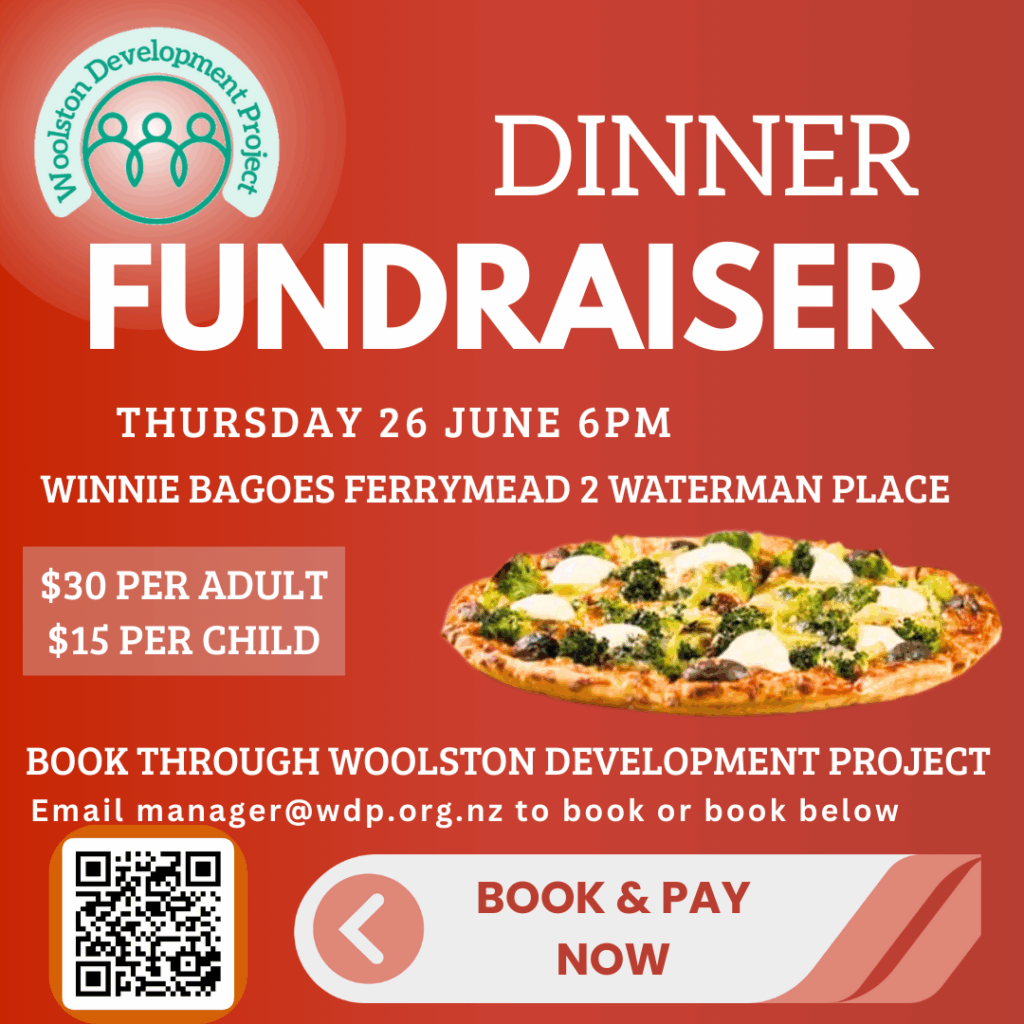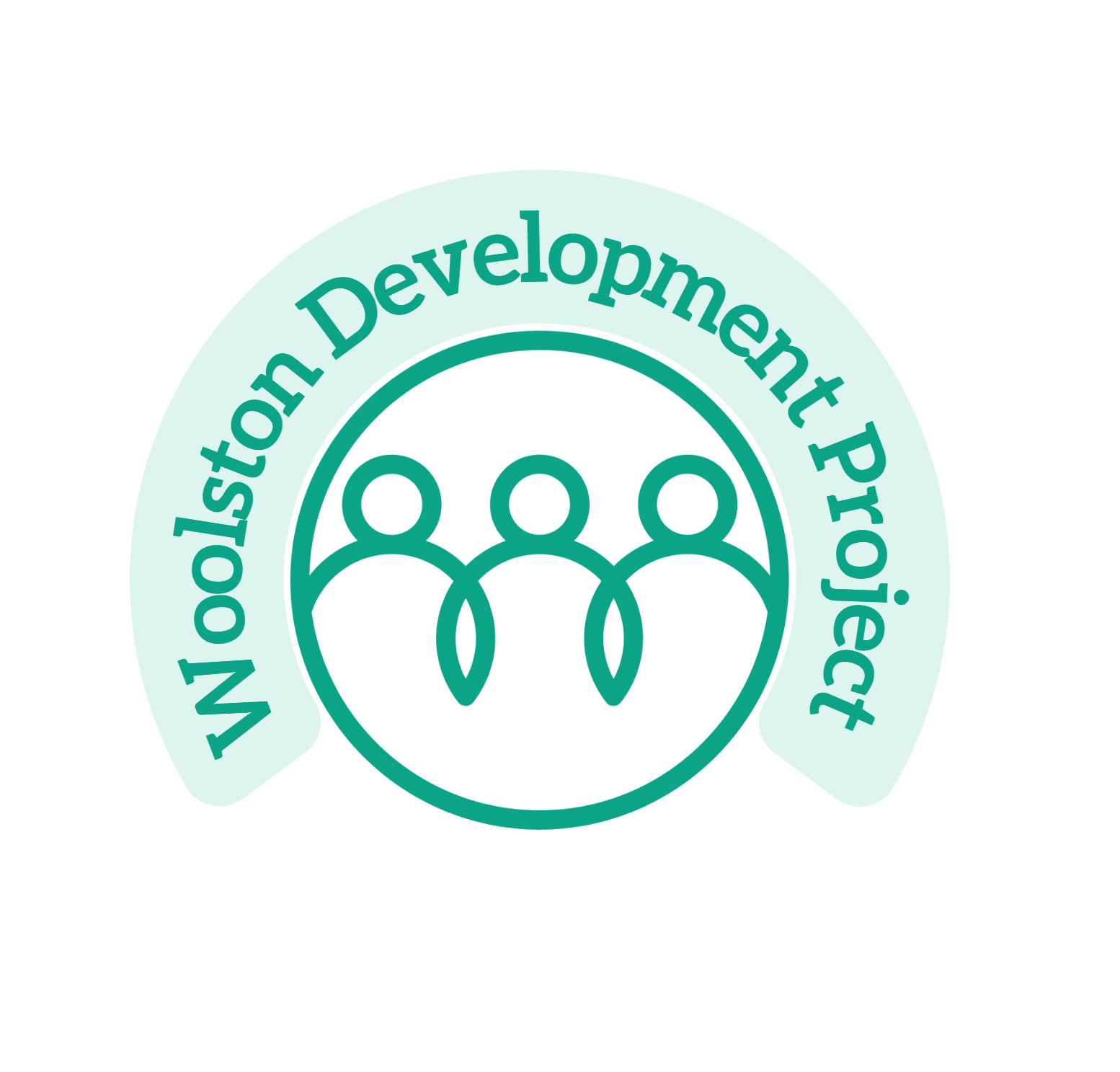Kia ora koutou,
Life is busy at Woolston Development Project at the moment and we have some news to share with you.
Dinner Fundraiser – 6pm Thursday 26 June 2025 at Winnie Bagoes Ferrymead. Thank you to those who have already booked in for this event – it costs $30 per adult and $15 per child and Woolston Development Project receives $10 per adult and $5 per child. How to book – email me at manager@wdp.org.nz and make payment to Woolston Development Project Incorporated, 03 1599 0022285 000 or use the QR code on the flyer I have attached to this email. Once you have paid, your place will be confirmed. We need all bookings paid for and confirmed by Tuesday 24 June so that we can confirm numbers and dietary requirements with Winnie Bagoes on Wednesday 25 June.
Raffle
We will be running a raffle to be drawn at the fundraiser. Keep an eye on our Facebook page for details of the prizes. Raffle tickets will be $5 and you can purchase them by internet banking or in person on the night of the fundraiser in cash (or drop cash off to us at WDP).
June July Holiday Programme
Attached is our latest holiday programme flyer. Spaces are already being booked by whānau who don’t attend during term time so please get your enrolments in to us as soon as possible. We have a maximum capacity of 30 children per day.
WDP’s commitment to equity
Equity differs from equality because equality assumes people are the same- a one shoe fits all approach – regardless of what their actual needs and desires are. Equity, on the other hand, is about recognising that we aren’t all the same and we have differing needs and desires. Everyone is different, bringing different backgrounds, experiences, needs and abilities to the table. The idea that we are all born on a level playing field is demonstrably false – we don’t choose our DNA or our parents or whether we are born into a community which experiences discrimination for simply being who they are.
How does this look at WDP? There are multiple ways we are working towards an equitable future for the people in our community at WDP.
1. At governance level, Woolston Development Project’s strategic plan states: WDP is committed to equity for Māori in our community. To that end, we have contracted Tavita Mortimer-Vito of Kia Kōrero to work with our organisation to develop our understanding of te ao Māori – Māori worldview – and implement meaningful change in our mahi which will lead to equity for Māori in our community. Our regular staff team members are meeting regularly with Tavita to develop our understanding and look at how we make meaningful change in the way we deliver our programmes, services and community development initiatives in line with te ao Māori One outcome of this mahi has been realising that our values as a staff team are already similar to the values of te ao Māori – we want our OSCAR tamariki to feel at home here – feel like they’re part of a whānau with people who care and support them. We want everyone who walks through our door to feel welcome and safe and respected. This means we are trying to make sure we pronounce names correctly – it is a work in progress for most of us but the fact we are trying to do this is a good start.
2. Recognising and acknowledging the different ethnic groups who are represented on our programmes. Our OSCAR tamariki come from a diverse range of ethnic groups: Māori, Pākehā/NZ European, Samoan, Tongan, Indian, Chinese, Japanese, Iranian, Russian, Chilean, Thai, to name but a few. Ensuring that we have the right kai available which accommodates cultural or religious dietary requirements is one way we do this. Providing vegan and vegetarian options or remembering that a specific child does not eat beef products or red meat are simple things we can do to ensure that their cultural needs are met. It might also include having colouring-in sheets which celebrate particular cultural festivals.
3. Becoming neurodivergent affirming and trauma informed in our practice, whether it is on our OSCAR programmes or among the adults who engage with us. We are finding an increasing number of our tamariki are arriving with either diagnoses of neurodevelopmental conditions like autism, ADHD, or sensory processing sensitivities, displaying symptoms of these without yet having a diagnosis, or with substantial experience of trauma. Many of our staff members have lived experience in these areas, and of parenting neurodivergent children. Recently the majority of our staff team did the Autism and Rangatahi training offered by Safe for Children. One of the approaches to working with tamariki which was raised in the workshop was the Collaborative & Proactive Solutions (CPS) model. This includes recognising that concerning behaviour is due to an unmet need or a skill that the child (or even the adult!) does not yet have. This is already a model which we have been discussing implementing and if you would like to find out more about it, the New Zealand page for CPS is https://livesinthebalance.org/nz/ Being trauma-informed means recognising that for some people, some situations will trigger trauma-related reactions. And, being neurodivergent frequently means a person has experienced a significant level of trauma because it is traumatic being neurodivergent in a neurotypical world. Couple this with the high degree of heredity of neurodevelopmental conditions and this can mean that neurodivergent parents are parenting neurodivergent children – and this can be hard work. If you are interested in learning more about neurodiversity, there are many places to find out more information, including ADHD New Zealand, Autism New Zealand and similar local and national organisations. How to ADHD, Russell Barkley, and ADHD Love are excellent ADHD-related YouTube channels.
At times we will offer something a little different to different people depending on their need for support. This might take place in the context of the OSCAR programme for a particular child or it might include a referral to our Financial Mentor for an adult who is participating in another of our activities or it might include something else. We can’t afford to provide the equivalent of a teacher aide on our OSCAR programmes because we don’t have enough funding for this level of care, but we can and do look at what we offer our tamariki to ensure that they enjoy themselves here.
4. Working slowly towards an accessible physical space – WDP’s location on a floodplain means that our building is elevated above the ground and requires steps to enter any of our external doors. We want to change this, but it is taking a while to obtain quotes for this work – and bear in mind that we will need to seek building consent or an exemption from building consent for this work. This means we will need to pay a licensed building practitioner (design) to design the ramp as well as pay for the materials and labour. Along with the ramp, some work will need to be done to change one of our toilets to make it accessible, and widen certain doorways.
Ngā mihi nui,
Eddie Hayes
—
Manager
Woolston Development Project

